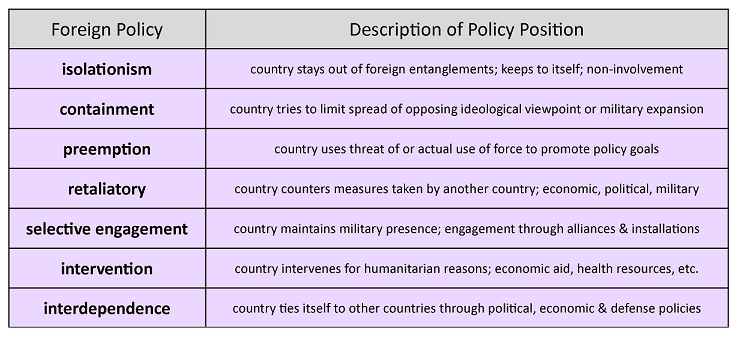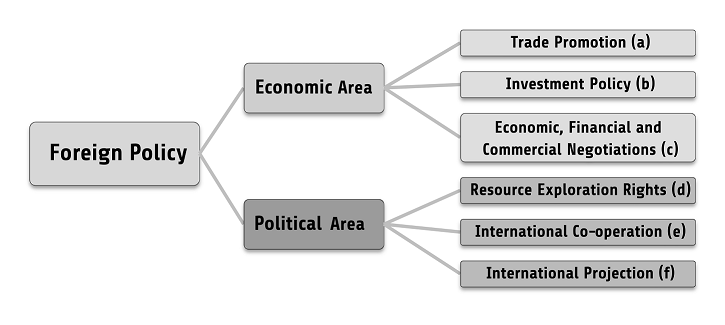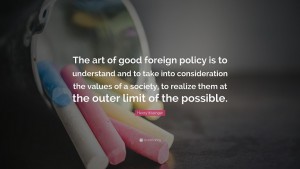Foreign Policy
Foreign policies are, in most cases, designed through coalitions of domestic and international actors and groups. When analyzing the head of government, or in other words, the executor of foreign policies, many motivating factors can be identified to explain the rationale behind decisions taken. Some factors of influence include the leader’s own personality and cognition, degree of rationality, domestic politics and international and domestic interest groups. However out of all the factors mentioned, it is domestic political environment that shapes the entire framework of decision-making in a country even in international context. The scope of the head of government in making decisions is first and foremost defined by the political system where he is operating. Depending on the power vested in his post and the importance of political and public consensus in the state in question, the head of government can make foreign policy decisions. Other factors such as rationality, personality, international organizations also hold influence on the head of government. However, they can also be compromised by the political environment, again depending on the kind of system practiced.
Foreign policy, which includes all interactions of individual nation-states with other states, is designed by the head of government with the aim of achieving complex domestic and international agendas. It means foreign policy is intimately linked with the domestic politics. As foreign policies form the base for international interactions between individual states, the foreign arena is used to defend domestic interests, and the course of domestic politics determines various factors abroad. It is due to this reason that foreign policy-making usually involves an elaborate series of steps where domestic politics plays an important role.
Introduction
Politics is not an abstract concept produced by theorists outside the realm of practical developments or solely with a normative commitment to an idealized order. At an abstract level, politics can be seen as a particular kind of engagement with an aim to acquire enough power and capability to influence the identity, interests and behaviours of others, both at home and abroad. Deciding ‘who gets what and when’ lies at the center of various kinds of political engagements.
From a philosophical perspective, all political activities, whether they are conducted at the individual, family, societal, state, international or global levels, have one overriding goal: to ensure the physical integrity, prosperity and well-being of the actor that engages in such activities. Whether we talk about states, individuals or other political actors, all political activities are also normative in essence.
Ensuring physical survival, trying to become more powerful than others and acquiring the tools so that one can transform others with the influence of one’s own image, are all normative exercises.
We all believe that we deserve to exist in this world and, for that, we need to strive to bring into existence a friendly environment. If we don’t live in a friendly environment, neither our physical survival nor mental integrity can be guaranteed. The need to pursue transformational policies at different scales has become more acute in recent years as growing exposure to others alongside the processes of globalization, integration and transnationalism has begun affecting our lives more decisively than ever.
We no longer have the luxury of separating ourselves from others and live in our ghettos. The idea that we need to survive is at its roots a normative claim, for we believe that our existence in this world matters. From this angle, all normative preachings with respect to how things at home and abroad should be organized do in fact reflect the quintessential goal of politics, i.e. to survive physically and spiritually.
Looking from this perspective, one can safely argue that different understandings of how things should be done, in fact, reflect our different interpretations of what exists in reality. The idealized world we cherish constitutes our real world. Our individual prescriptions of a much better and just life do serve our need to survive.
Foreign policy and political environment
Foreign policy is the sum of official external relations conducted by an independent actor (usually a state) in international relations. It includes not only military action but trade and humanitarian interactions as well.
The political environment of a country includes all laws, government agencies and lobbying groups that influence or restrict individuals or organizations in the society. The political system determines the scope and power of a head of state in making decisions related to foreign policy.
The factors that sway the foreign policy-making vary from state to state, depending on the political system the head of government operates in. For example, for the head of government in a democracy such as Pakistan, consensus of the office and public opinion will play an important role. A socialist republic like China may be harsher in taking decisions which may not meet public consensus but have a long-term national agenda.
Foreign policy goals
As in domestic politics, the underlying goal of politicians in foreign politics is to ensure a nation’s survival through the employment of different strategies and instruments. Irrespective of regime type, political ideologies, national role conceptualizations, formal rules of political arrangements, personality traits of decision-makers and many other variables that potentially affect foreign policy, the real motivation of a state is to help bring into existence a friendly environment at home and abroad. Strategies, road maps, blueprints, tactics and instruments might change, yet the key goal remains the same.
The link
Looking at foreign policy from this perspective suggests that there are no clear dividing lines between domestic and foreign policy. Similar to Prussian military theorist Carl Von Clausewitz’s famous dictum that war is the continuation of politics by other means, foreign policy is also the continuation of domestic politics outside national boundaries.
As it is said in the context of American politics, foreign policy does not stop at the water’s edge. All international engagements are undertaken with domestic political considerations in the background. This is the case all over the world and neither regime type, personal characteristics of rulers, the geographical location of countries nor power distribution within the existing system would change this fact.
Philosophical base
As the constructivist international relations theory puts it succinctly, domestic and foreign politics are constitutive of each other. Therefore, it is wrong to accuse any politician in any particular country of putting political interests at the centre of his or her political engagements at home and abroad. As classical realists argue, the rules of politics are the same internally and externally.
Yet such a characterization of politics should not lead us to conclude that the ends will always justify the means. Philosophers Thomas Hobbes, Hans J. Morgenthau and Kenneth Waltz are correct to point out the anarchical nature of the political environment in the general sense and the importance of survival logic undergirding different political activities.
Yet, on the other hand, Machiavelli’s abject amorality in political life should not distract us from the fact that social relations at home and abroad can only be built on the basis of two timeless maxims, namely: “people are social animals” and “treat others the way you want them to treat you.”
Role of the policymaker
National leaders, especially the heads of government, have to play a two-level game between international and domestic politics. The head of government in any kind of political system is motivated by two similar goals: retain political power and build and maintain policy coalitions. The domestic politics can also influence him either because he wants to achieve domestic goals through foreign policies or he wants his foreign policy decisions not to interfere with domestic agendas.
The head of the government has to consider domestic sentiments as well as the international situation. If there is a conflict between domestic and international interest the head of the government will probably give emphasis to domestic interest, or surpass the situation altogether.
In the modern world, in most political systems, implementation of proposed policies requires a consensus by the government, and not only the leader’s whim. The degree of acceptability required will depend on the political system where the decision-maker is operating. For example, any foreign policy in a democratic system that does not have consensus is unlikely to succeed.
A pertinent case study
The influence of domestic politics can be demonstrated here with the example of an India-US treaty. The foreign policy in question here was a nuclear treaty that was to be made between India and the United States in 2005. India had not signed the Nuclear Non-Proliferation Treaty (NPT) and demanded to hold on to and foster its nuclear capabilities to defend itself as long as other countries did so as well. There was opposition from US regarding that and especially regarding the tests conducted by India as well as Pakistan in 1998. The 2005 treaty was designed with the aim of allowing India to continue not signing the NPT in exchange of allowing the International Atomic Energy Agency (IAEA) to conduct inspections of its civilian nuclear facilities. This treaty had also allowed India to reprocess nuclear fuel for energy generation and validated its position as a nuclear weapons power. Despite it being a win-win situation for India, the head of government was prepared to withdraw from this treaty to protect domestic political issues. At that time, a coalition government of the UPA, was in power in India. Manmohan Singh was selected by the Congress Party leadership to be prime minister and head of the government. In 2007, the communist party, threatened to bring down the coalition government if this nuclear agreement was made with the United States. The main opposition party, BJP also strongly opposed this treaty as the collapse of the government would be beneficial for them. The treaty in discussion did not require the parliament’s approval but pressured by the threat of losing office, the head of government was prepared to back down from this treaty. If the Communist party had withdrawn from the coalition, re-elections would be called and there was no guarantee for Congress that they will regain power. So, Manmohan Singh declared that he would not risk a general election for the sake of the treaty. The point highlighted by this example is that the head of government of India was prepared to sacrifice a very important foreign policy for domestic politics. So, it can be concluded that the head of government tries to satisfy domestic pressures even at the cost of international developments.
Some examples
- USA
Foreign Policies of the United States are greatly influenced by the domestic political environment, the economic implications and the president’s standing in the polls in lieu of policies taken by him. In case of wars, it is even more sensitive. War requires resources such as money, troops and equipment and in a democracy, resources require continued public support. The people’s representatives in Congress control public spending. If a majority of lawmakers vote against the war, it will be defunded. If a military plan is not supported by majority of lawmakers, it will be called off or at best be changed. However, it is the President’s job to convince the Congress of the validity of any decisions, which must incorporate domestic political agenda. For example, in World War II, US Army Chief of Staff Gen. George C. Marshall recommended that the right military strategy was to focus on Germany first, merely holding the line against Japan until the bigger threat was defeated in Europe and only after Germany was out of the way should the country move forces east and deal with the Japanese. President Franklin D. Roosevelt opted instead for parallel offensives against both Germany and Japan at the same time. According to his policy, the United States actually attacked Japan before it began its first attacks on Germany. A crucial motivating factor behind this decision was that Roosevelt was worried that he would lose domestic political support for the war if he ignored the country that attacked the United States at Pearl Harbour, fighting Germans instead.
- Germany
In his 1969 book ‘War of Illusions (Krieg der Illusionen)’, Fritz Fischer, professor emeritus at Hamburg University and one of the most influential historians of modern Germany since 1945, offered a detailed study of German politics from 1911 to 1914 in which he offered a Primat der Innenpolitik (Primacy of Domestic Politics) analysis of German foreign policy. In Fischer’s view, the Imperial German state saw itself under siege by rising demands for democracy at home and looked to distract democratic strivings through a policy of aggression abroad.
Over the past few months, Chinese foreign policy has taken a dramatic and aggressive turn. China has lashed out at Australia for questioning its handling of the Covid-19 pandemic, bolstered its claims in the South China Sea, stepped up patrols around the Japanese-controlled Senkaku/Diaoyu Islands, clashed with India in the Himalayas, and sent warplanes across the median line in the Taiwan Strait. It has also doubled down on efforts to defend Huawei by charging two Canadians, Michael Kovrig and Michael Spavor, with espionage after a Canadian court refused to stop extradition proceedings against CFO Meng Wanzhou, and warned the United Kingdom it would “bear the consequences” for excluding the telecom giant from its 5G network. From these issues, it is evident that since the Chinese leaders cannot afford to appear weak or indecisive at home, they feel compelled to act strongly and forcefully abroad, especially given the popular nationalism the party-state has fostered since 1989. In fact, this phenomenon is the only reasonable explanation for the emergence of China’s combative “Wolf Warrior” diplomacy which has alienated many outside China, while winning kudos at home.
Conclusion
Foreign policy is made and conducted in complex domestic and international environments. Domestic politics influences foreign policy decisions and if a policy is not accepted at home, it is unlikely to succeed in the international context. If one cardinal rule of politics is to survive and maximize power, the other is that human beings cannot live alone. All political activities are conducted in social environments, and we should never cease our efforts to strike the right balance between survival or power needs on the one hand and the eternal principle that “unity can only be achieved in diversity” on the other.
 Jahangir's World Times First Comprehensive Magazine for students/teachers of competitive exams and general readers as well.
Jahangir's World Times First Comprehensive Magazine for students/teachers of competitive exams and general readers as well.




